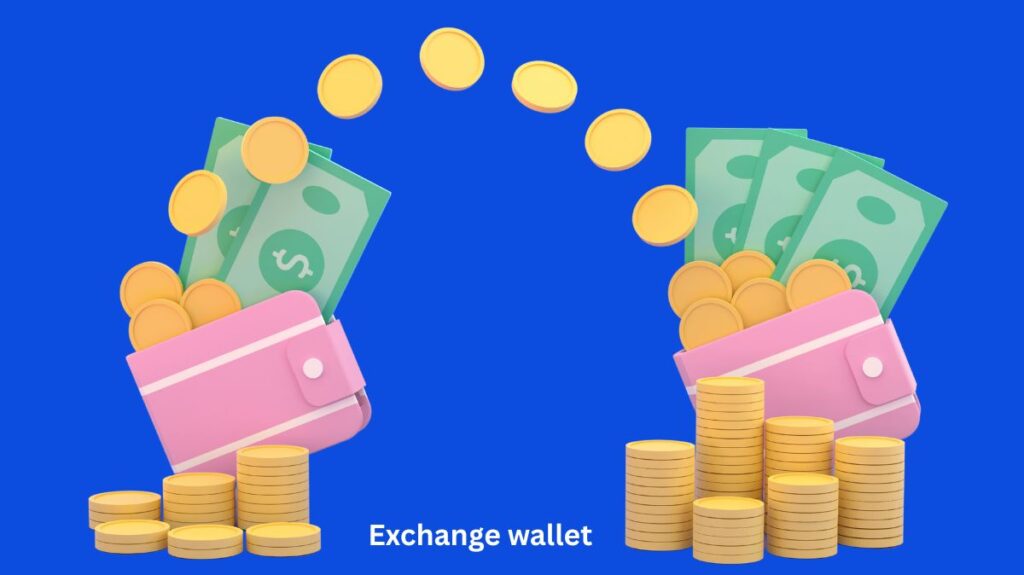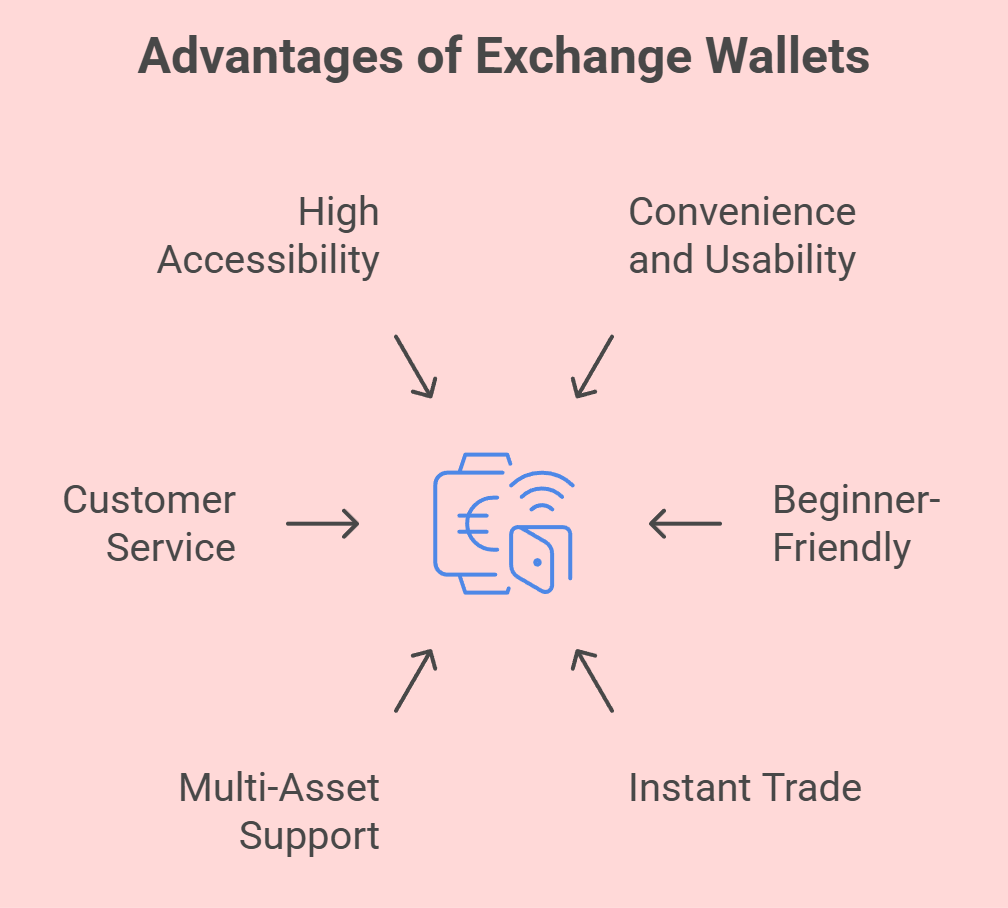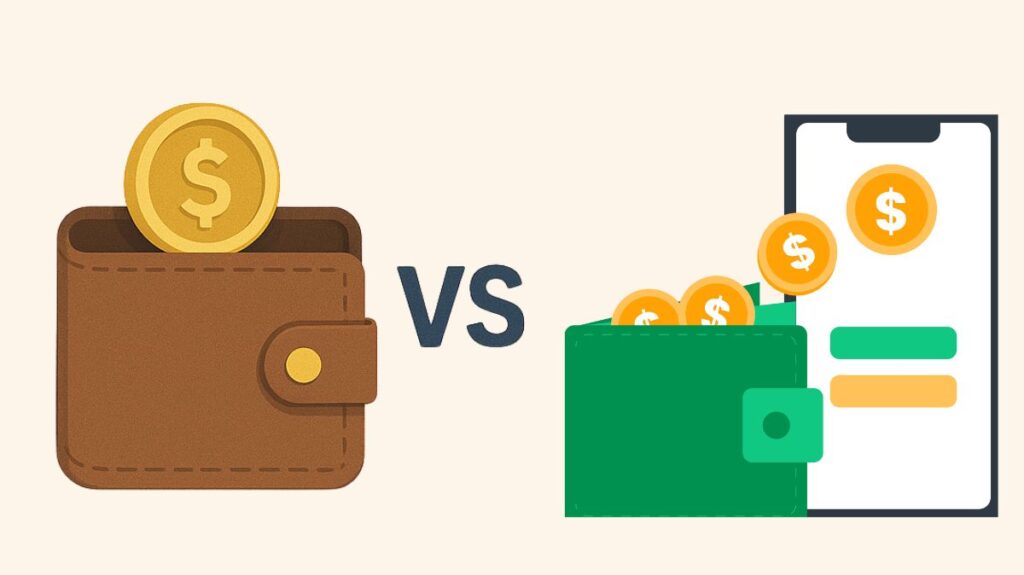This article covered a number of topics, including: How Exchange Wallets works; Features and Functionalities; Security and Control; Advantages and Disadvantages; Examples; When to Use an Exchange Wallet; and Wallet vs Exchange.
What is an exchange wallet?

A cryptocurrency wallet offered by a cryptocurrency exchange platform is known as an exchange wallet. An exchange like Binance, Coinbase, Kraken, or Gemini automatically creates a wallet for you to keep your cryptocurrency assets when you register an account. Since the exchange is a third-party organisation that oversees and manages the private keys on your behalf, these wallets are a particular kind of custodial wallet. You have to have complete faith that the exchange will protect your keys and handle your money sensibly.
How Exchange Wallets Work
Creation of Accounts and Wallets
- Making an account on an exchange platform is the first step.
- After that, the exchange creates distinct wallet addresses for each cryptocurrency associated with your account.
Money Management
- Your account balance is internally updated when you deposit money, which is then sent into the exchange’s wallet system.
- The exchange oversees the security and backup of user funds in addition to pooling them.
- Instead of being a direct representation of a particular wallet on the public blockchain, your account balance on the exchange is effectively a record on the exchange’s internal ledger. All on-chain deposits and withdrawals are managed by the exchange.
Exchanges’ Internal Key Management
- Exchanges utilise a system that includes various forms of cryptographic key storage to internally manage user monies.
- Deposit Addresses: To enable the exchange to credit the money to the appropriate user account, users submit money to a different deposit address that the exchange provides.
- Warm Wallets: To improve security, deposited money is usually automatically transferred to a warm wallet, which is set up to send money only to pre-selected, whitelisted addresses.
- Cold Storage Wallets: Incoming money are allocated to either hot or cold storage by the warm wallet. By keeping private keys off the internet, cold storage makes them extremely safe from viruses and online threats. Although transactions from cold storage can take 24 to 48 hours since human participation is required, most exchanges strive to retain over 95% of customer cash in cold storage to reduce potential losses from hacks.
- Hot Storage Wallets (Withdrawal Wallets): These internet-connected wallets store a small amount of money for quick withdrawals. They are more susceptible to hacker compromise, yet being practical for speedy transactions. Less than 5% of client funds are normally kept in hot storage by exchanges.
Also Read About Types Of Blockchain Wallets: Hot, Cold, Hardware And More
Essential Features and Functionalities
Exchange wallets are designed to operate as a user interface for blockchain networks and cryptocurrency management. They are made to hold a user’s private and public cryptographic keys.
- Online Accessibility & Convenience: Exchange wallets are incredibly easy to access from any device because they are web or mobile-based and constantly connected to the internet. They are seen to be among the most practical methods for users to save and access their cryptographic keys.
- Integrated Features: A lot of exchange wallets come with built-in cryptocurrency buying and selling features. By offering functions like order books and cryptocurrency swapping, they make trading easier. They frequently have direct integration with the trading engine and other services of the exchange.
- Speed & Liquidity: Without the delays and costs connected with on-chain transfers, transactions that are mostly carried out on the exchange’s internal ledger are completed nearly instantaneously. For aggressive traders, this offers instant access to a large selection of cryptocurrencies and trading pairings.
- Multi-Asset Support: A variety of cryptocurrencies are supported by them.
Also Read About Disadvantages Of Centralized Exchanges & Risks In Blockchain
| Feature | Description |
|---|---|
| Provided by Exchange | Integrated into your exchange account no need to set up a separate wallet. |
| Custodial | The exchange holds and secures your private keys for you. |
| Supports Multiple Assets | You can store various cryptocurrencies supported by that exchange. |
| Linked to Trading | Directly connected to the exchange’s trading platform you can easily buy, sell, and transfer funds. |
| No Control Over Keys | Users don’t directly control the private keys (in most cases). |
| Hot Wallets | These wallets are connected to the internet and managed by the exchange. |
Security and Control (Custodial Nature)
The primary disadvantage of “Not Your Keys, Not Your Coins” is that you have no control over your private keys. This core idea in the cryptocurrency space emphasises how completely dependent you are on the exchange to protect your money.
Users must have complete faith in the online wallet service provider to protect their keys and handle their money sensibly.
Security Risks
- Hacking Risk: Exchanges are vulnerable to security threats, hacks, and exploits and are frequently targeted by hackers. It is possible for money to be stolen if the exchange is compromised.
- Account Freezes: For legal, policy, or regulatory reasons, the exchange may freeze your account or money.
- Bankruptcy Risk: Since users do not directly own or control the keys, they could lose their money if the exchange files for bankruptcy.
- Limited Privacy: Usually, you have to trust the exchange with your personal information and perform Know Your Customer (KYC) identification verification.
- Centralization Risk: For hackers, exchange wallets serve as a focal point of attack.
Also Read About What Is Software Wallet? And Software Wallet Advantages
Exchange Security methods
The majority of online wallets use security methods including multi-factor authentication (e.g., password, biometric, and One-Time Password combinations) and strong password policies to reduce risks. Usually, they also include tools for recovering and changing passwords.
Best Practices for Users
- Turn two-factor authentication (two-FA) on for your account.
- Make use of strong, one-of-a-kind passwords and update them frequently.
- Always check the exchange’s URL and be wary of fraudulent websites.
- Keep an eye on exchange security procedures and use trustworthy platforms.
- If you can’t remember your password, you can usually use a regular account recovery procedure to get back into your account and access your money.
Advantages of Exchange Wallets

- Convenience and Usability: Since you don’t have to install software or handle keys yourself, they are incredibly user-friendly, especially for novices.
- Beginner-Friendly: Easy to use for those who are unfamiliar with cryptocurrency.
- Instant trade: Because transactions take place on the exchange’s internal ledger, funds are instantly available for trade on the exchange.
- Support for a variety of cryptocurrencies is known as multi-asset support.
- Customer service: Although recovering stolen money is not always guaranteed, exchanges frequently offer assistance if you run into problems.
- High accessibility: Easily accessible from any gadget.
Disadvantages and Risks of Exchange Wallets
- Absence of Key Ownership: You are totally dependent on the exchange to protect your money because you do not possess the keys.
- Hacking Risk: Exchanges are frequently targeted by hackers, and if the platform is compromised, money could be taken.
- Account Freezes: For a number of reasons, the exchange may freeze your money or account.
- Limited Privacy: KYC verification is necessary.
- Not the Best for Long-Term Storage: Active traders would benefit more from this than long-term holders.
- Because they are custodial, there is a significant counterparty risk.
- Lack of Control: The exchange may set withdrawal restrictions or limit access to specific cryptocurrencies, so you do not have as much control over your money as you would with a non-custodial wallet.
- Limited Functionality: They are mostly used for trading and are unable to store non-fungible tokens (NFTs), engage in DeFi protocols, or directly communicate with decentralized apps (dApps).
When to Use an Exchange Wallet
- Active Traders: Perfect for people who need to transfer money fast for purchases and sales.
- Short-Term Storage: Ideal for storing small to medium quantities for a brief period of time.
- Beginners: Ideal for those who are just getting started and prefer a clear-cut, easy experience.
When Exchange Wallets Are Not Useful
Large-scale cryptocurrency storage or long-term holding is not advised. Withdrawing money to your own non-custodial wallet such as a hardware or cold wallet where you are the only one with access to the private keys is strongly advised for these uses.
Examples of Popular Exchanges with Wallets
- The Binance
- One of the biggest and most established suppliers of custodial wallets is Coinbase.
- The Kraken
- Gemini
- Bitfinex
- The Huobi
- The KuCoin
- The Exodus
- Guarda
Wallet vs exchange

| Feature | Crypto Wallet | Crypto Exchange |
|---|---|---|
| Purpose | Stores and manages your cryptocurrency securely | Platform to buy, sell, and trade cryptocurrency |
| Control of Private Keys | You control your private keys (non-custodial) | Exchange controls your private keys (custodial) |
| Security | More secure if non-custodial and properly used | Less secure if funds are stored on the exchange |
| Functionality | Send, receive, and store crypto | Trade between different cryptocurrencies and fiat |
| Examples | MetaMask, Trust Wallet, Ledger | Binance, Coinbase, Kraken |
| Accessibility | Requires setup and backup of seed phrase | Easy to use with email/password login |
| Best For | Long-term holding and personal control | Frequent trading and buying/selling |
| Internet Requirement | Some wallets are offline (hardware wallets) | Requires internet connection |
| Fees | Network transaction fees only | Trading fees and withdrawal fees |
